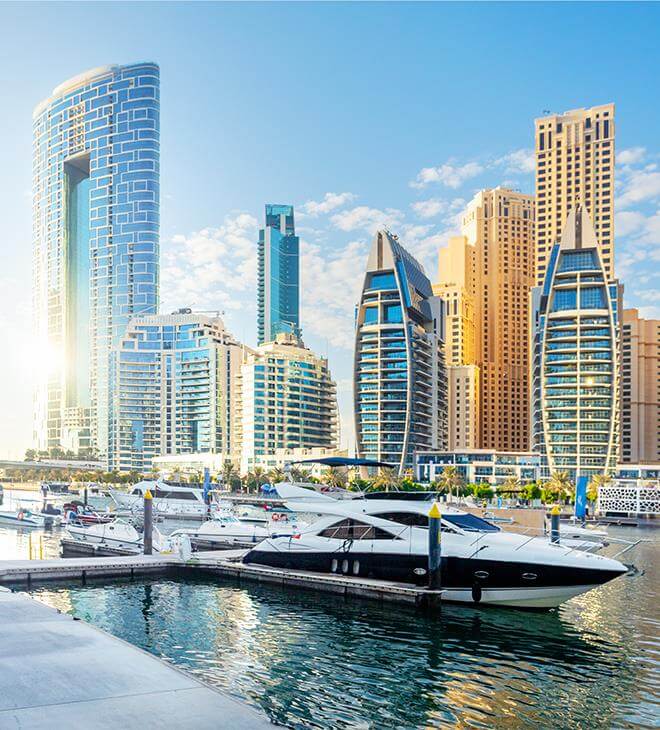Tips for property investment in Dubai

Dubai’s property market has matured into one of the most dynamic and investor-friendly in the world. A combination of rapid economic growth, ambitious urban development, and investor-focused regulations has transformed the city into a magnet for buyers from across the globe.
While the rewards can be substantial, investing in Dubai’s property market requires careful planning, local market insights and a clear strategy. Here’s a practical guide to help you make informed decisions – whether you’re a first-time buyer or an experienced investor expanding your portfolio.
Location
When deciding on where to invest in Dubai, location is not only crucial to determining rental income but also long-term capital growth. The emirate’s prime neighbourhoods including Business Bay, Dubai Marina, Dubai Sports City, Jumeirah Village Circle and Jumeirah Village Triangle consistently attract tenants from across the city.
According to Bayut, rental yields in these areas range from 6–9%, well above many global cities. The reason? A blend of lifestyle appeal, excellent infrastructure and transport connectivity.
Dubai Marina, for example, offers waterfront living minutes from business hubs like Dubai Media City, while Business Bay offers easy access to landmarks such as Dubai Canal, Burj Khalifa and The Dubai Mall. These amenities attract both residents and tourists, ensuring high occupancy rates and competitive rental rates.
Tap into market momentum
Dubai’s real estate market is experiencing one of its longest growth cycles on record. Prices have risen approximately 75% since February 2021, reaching AED 1,750 per sq ft – the highest level since before the 2008 property boom.
Demand is being driven by two key factors:
- Residency reforms, such as the Golden Visa programme, making it easier for investors to stay in the city long-term.
- Population growth. The city is now home to almost 4 million residents, which is pressuring housing supply.
This momentum signals opportunity but also means buyers should act strategically – securing well-priced properties in growth areas before competition pushes prices higher.
Know your costs – and your tax advantages
One of Dubai’s strongest selling points is its tax-free environment for property investors:
- No property tax
- No capital gains tax
- No income tax on rental earnings
The main upfront cost is the 4% property transfer fee paid to the Dubai Land Department (DLD), plus minor registration and legal fees. Investors should also budget for ongoing expenses such as maintenance charges, service fees and utilities.
According to the DLD, service fees vary depending on the property type and amenities but can significantly impact rental yield if not accounted for early.
Off-plan vs ready-to-move
Off-plan property sales still dominate overall transactions in Dubai. These properties, bought before construction is complete, often offer:
- Lower entry prices
- Flexible payment plans
- Capital appreciation potential of 10–15% during the build phase
However, ready-to-move-in units offer immediate rental income and no delivery risk – ideal for those wanting instant cash flow. The right choice depends on your investment goals and appetite for project timelines.
Monitor market developments
Large-scale projects can reshape property demand. The relaunch of Palm Jebel Ali in 2024, for instance, has sparked strong interest, with property handovers expected to commence in late 2026.
Similarly, Dubai’s ongoing expansion of metro lines, road networks and leisure destinations will likely boost values in newly connected areas, such as Jumeirah Village. Savvy investors keep an eye on planned infrastructure when choosing where to buy.
Partner with a trusted developer and capitalise on Dubai’s tourism growth
Choosing the right developer is one of the most important steps in safeguarding your investment. A reputable firm with a strong track record not only delivers properties on time and to high standards but also ensures ongoing maintenance that protects the long-term value of your asset.
The First Group, one of Dubai’s leading developers of landmark hospitality real estate, offers investors a unique opportunity: the ability to purchase individual hotel rooms in premium developments – a compelling alternative to buying conventional residential property.
This model taps directly into Dubai’s thriving travel and tourism sector. In 2024, the city welcomed 18.72 million international overnight visitors, surpassing the previous record of 17.15 million set in 2023, according to the Dubai Department of Economy and Tourism. The city’s average hotel occupancy rate stood at 78% – one of the highest rates globally – with the industry’s strong performance supported by world-class infrastructure, iconic attractions, a bumper calendar of year-round events and strong air connectivity.
Benefits of owning a hotel guestroom
By owning a hotel room, investors benefit from this robust demand without managing tenants or handling day-to-day operations. Owners earn a share of the revenue generated by their property, with returns enhanced by Dubai’s position as one of the world’s most popular destinations.
With over 30 years of combined experience, The First Group has forged a reputation for identifying high-potential locations for its award-winning developments. As a leading hotel operator, the firm is renowned for delivering exceptional guest experiences – a factor that helps drive repeat bookings and maximise investor returns.
For buyers seeking passive income, professional management and access to one of the world’s most dynamic hotel markets, The First Group’s hotel room investment model offers a smart, hassle-free alternative to traditional residential ownership.



